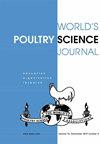添加杆菌肽作为生长促进剂下调肉仔鸡肠道内先天和适应性细胞因子
IF 3.5
3区 农林科学
Q1 AGRICULTURE, DAIRY & ANIMAL SCIENCE
引用次数: 0
摘要
在过去的十年中,作为生长促进剂(AGP)的抗生素的退出增加了家禽业的一些挑战,例如肠道疾病的增加。专家认为,agp通过调节肠道微生物群来提高运动能力,从而产生抗炎作用。然而,AGPs与宿主肠道免疫系统的影响和相互作用仍然未知,这代表了开发AGPs有效替代品的问题。因此,本研究旨在更好地了解杆菌肽作为AGP的潜在作用机制及其对肠道免疫系统的影响。90日龄鸡随机分为2个处理,每3个重复15只鸡,对照组(CNT)饲喂玉米/豆粕标准饲粮,对照组饲粮中添加50 g/t杆菌肽(BMD)。采用鸡特异性细胞因子/趋化因子肽ELISA试剂盒,测定14、21、28和36日龄空肠和回肠细胞因子和趋化因子(IFN-α、IFN-γ、IL-16、IL-10、IL-21、IL-6、M-CSF、MIP-3α、MIP-1β、VEGF和CCL-5)的产生情况。在第14天,肉鸡空肠中IL-16、IFN-γ、M-CSF、IL-21、MIP-1β和VEGF的产量降低。然而,从第21天到第36天,BMD对空肠细胞因子产量的影响可以忽略不计,但在第36天,CCL-5的产量降低。在回肠,BMD对细胞因子谱的影响始于28 d,此时添加BMD的肉鸡IL-6产生水平降低。在第36天,BMD降低了回肠组织中IL-16和MIP-3α的产生,但增加了VEGF的浓度。本研究表明,使用杆菌肽作为AGP可以调节小肠免疫系统,特别是在肉鸡生命的第一阶段(长达14天)。此外,BMD的抗炎作用不仅包括先天免疫,而且似乎还影响适应性免疫反应的发展,如IL-21和IL-16的产生减少。由此可见,肉鸡饲料中常用的一种AGP具有局部抗炎作用。本文章由计算机程序翻译,如有差异,请以英文原文为准。
Bacitracin Supplementation as a Growth Promoter Down-Regulates Innate and Adaptive Cytokines in Broilers’ Intestines
In the past decade, the withdrawal of antibiotics used as growth promoters (AGP) has increased some poultry industry challenges, such as the rise of intestinal diseases. Experts advocate that AGPs improve performance due to the modulation of the intestinal microbiota, with resulting anti-inflammatory effects. However, the impact and interactions of AGPs with the host intestinal immune system are still unknown, which represents issues in developing effective alternatives for AGPs. Therefore, this study was aimed at better understanding the potential mechanism of action of bacitracin used as AGP and its impacts on the intestinal immune system. Ninety day-of-hatch chickens were randomly assigned to two treatments with three repetitions of fifteen birds, a control (CNT) group with a corn/soybean meal standard diet, and a control diet supplemented with 50 g/ton of feed of bacitracin (BMD). The cytokines’ and chemokines’ production (IFN-α, IFN-γ, IL-16, IL-10, IL-21, IL-6, M-CSF, MIP-3α, MIP-1β, VEGF and CCL-5) were assessed in the jejunum and ileum at 14, 21, 28 and 36 days of age by using a chicken-specific cytokine/chemokine peptide ELISA array. Broilers with BMD supplementation were found to have a lower production of IL-16, IFN-γ, M-CSF, IL-21, MIP-1β and VEGF in the jejunum at 14 d. However, from 21 through 36 days, the effect of BMD on cytokine production in the jejunum was negligible except for CCL-5, which was reduced at D36. In the ileum, BMD effects on the cytokine profile started at 28 d, when BMD-supplemented broilers showed a reduced IL-6 production level. At day 36, BMD reduced IL-16 and MIP-3α production but increased VEGF concentration in the ileum tissue. The present study demonstrated that the use of bacitracin as an AGP modulates the small intestine immune system, especially in the first phase of the broiler’s life (up to 14 days). Moreover, BMD anti-inflammatory effects include not only innate immunity but also seemed to influence the development of the adaptive immune response as seen by the decreased production of IL-21 and IL-16. These results demonstrate that a commonly used AGP in broiler feed had a local anti-inflammatory effect.
求助全文
通过发布文献求助,成功后即可免费获取论文全文。
去求助
来源期刊

World's Poultry Science Journal
农林科学-奶制品与动物科学
CiteScore
6.10
自引率
7.40%
发文量
55
审稿时长
12-24 weeks
期刊介绍:
World''s Poultry Science Journal is the official publication of the World’s Poultry Science Association. The journal provides authoritative reviews in poultry science and an international forum for the exchange and dissemination of information including research, education and industry organisation. Each issue includes poultry industry-related news, regional reports on global developments in poultry, reports from specialist scientific working groups, book reviews, association news and a calendar of forthcoming events. Coverage includes breeding, nutrition, welfare, husbandry, production systems, processing, product development, physiology, egg and meat quality, industry structure, economics and education. The journal is of interest to academics, researchers, students, extension workers and commercial poultry producers.
 求助内容:
求助内容: 应助结果提醒方式:
应助结果提醒方式:


